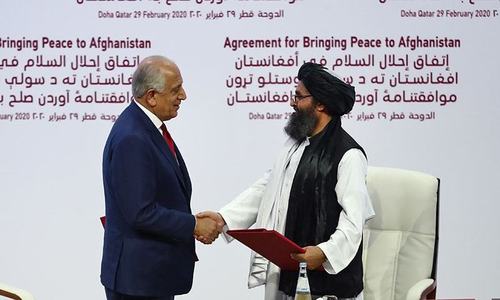UNITED NATIONS: The Taliban Leadership Council has established a range of commissions and bodies that replicate the offices and duties of a normal governmental organisation, says the latest UN report on the situation in Afghanistan.
The report, submitted recently to a UN Security Council committee, describes this arrangement as the Taliban shadow government, which seems to have a central structure as well as provincial and local administrative bodies.
The report also notes that the “Taliban are assessed to have close connections with Al Qaeda” and the group’s central leadership may face resistance from the lower ranks if it tries to uproot it, as promised in the US-Taliban agreement signed in February this year.
The monitoring team, which prepared the report with the help of the UN Assistance Mission in Afghanistan and Afghan government Interlocutors, notes that the Taliban leaders have steered the movement through negotiations with the United States to conclude an agreement.
“The process has increased their political leverage” and throughout this process, “the Taliban have managed to stay unified, despite internal divergences of view,” the team adds.
The monitors maintain that “the great majority of Taliban” will follow orders from their leadership relating to the recently signed agreement with the United States, “whatever those orders or directives may be.”
The monitors believe that the Taliban leaders proved capable of maintaining the discipline of their fighters during the reduction in violence period and are likely to maintain the same discipline during any ramping-up of fighting in 2020, while seeking to gain political leverage.
According to the report, The Taliban have reshuffled their shadow government structure over the winter in preparation for the 2020 summer, which is also the fighting season. Taliban members gathered in February to discuss the reorganisation of the shadow governance and military structure in the appointments in Badakhshan, Baghlan, Balkh, Bamyan, Kabul, Kapisa, Kunduz, Samangan and Takhar Provinces.
Abdul Aziz Abbasin, a senior member of the Haqqani Network and brother of Taliban deputy Sirajuddin Haqqani, ordered increased supplies of ammunition and explosive materials for Taliban forces in Ghazni, Wardak, Paktiya and Parwan Provinces.
One notable appointment in mid-February was the transfer of Mullah Abdul Rehman, better known by his alias of Pir Agha, from his position as shadow governor for Nangarhar to the role of shadow governor for Zabul. Agha leads the Taliban’s rapid reaction forces, known as the red units. He had been appointed shadow governor for Nangarhar to deal with the threat posed by the militant Islamic State group in Iraq and the Levant-Khorasan (ISIL-K).
The previous shadow governor for Zabul, Mullah Mohammad Essa, has replaced Pir Agha in Nangarhar. The monitors believe that the “appointment of Pir Agha to Zabul signals aggressive Taliban intent for the 2020 fighting season.”
The report notes that continued internal disagreements within the Taliban leadership grew more pronounced as a result of ongoing talks with the United States. However, the “Taliban leadership has been able to maintain the unity and discipline of its rank and file.”
Several Taliban factions emerged in the aftermath of the announcement of the death of Mullah Mohammad Omar. Some members of the they, however, point out that despite the public appearance of greater Taliban unity, existing fault lines have deepened as a consequence of the negotiations with the United States and aspects of the agreement.
There are also reported divisions within the Taliban’s Political Office, particularly between those aligned with Abdul Ghani Baradar and a more hard-line group close to Sher Mohammad Abbas Stanekzai.
Those at the Political Office in Doha understood the need for the Taliban to interact with the international community and show moderation, while rank-and-file fighters were reported not to share that view.
UN monitors and their Afghan interlocutors believe that the Taliban leadership had not fully disclosed the details of the agreement, particularly any commitment to cut ties with Al Qaeda and foreign terrorist fighters, for fear of a backlash — a matter that had surfaced repeatedly as a topic of acrimonious internal debate.
Published in Dawn, June 4th, 2020














































